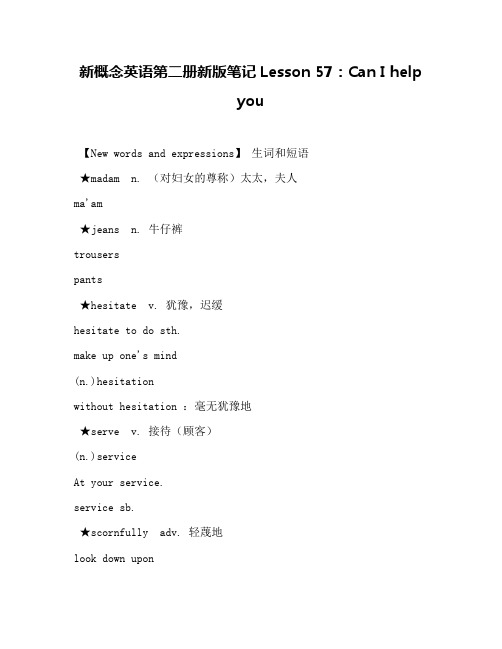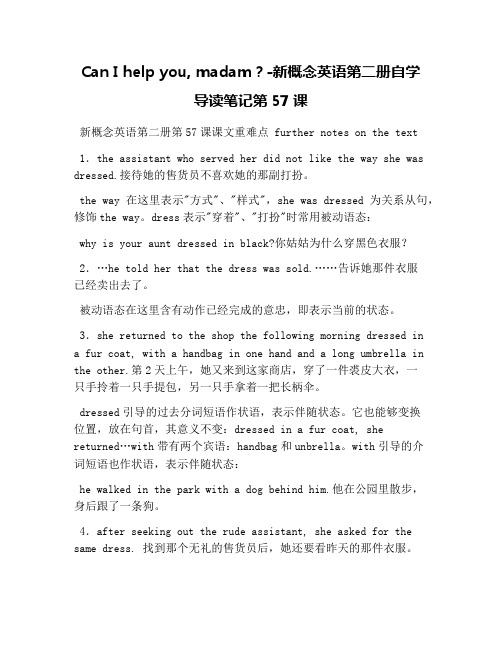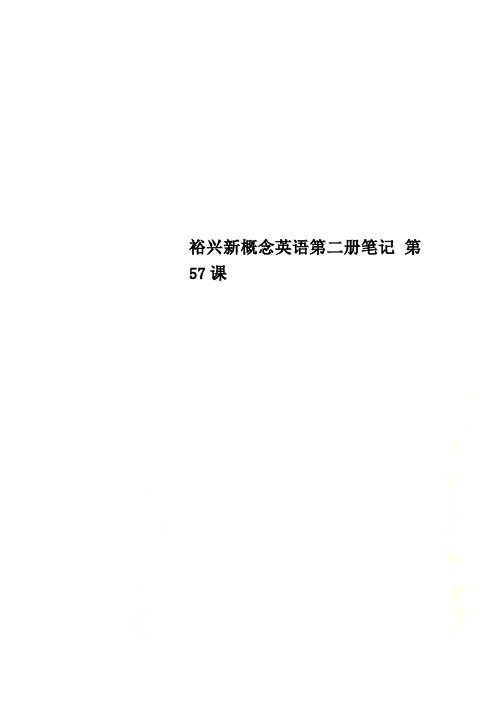裕兴新概念英语第二册笔记 第57课
新概念英语第二册第57课

新概念英语第二册第57课Lesson 57 in the New Concept English Book 2 introduces the use of the modal verb "must" to express logical deduction or certainty.The lesson begins by explaining that 'must' is used when the speaker is certain about something because there is strong evidence or logical reasoning. For example, if we see dark clouds, we might say, "It must rain soon." In this case, we are not guessing; we are certain based on the evidence of dark clouds.The example demonstrates that we use 'must' to talk about the present or future. However, for the past, we use 'must have.' For instance, if we see someone coming in with a wet umbrella, we might remark, "It must have rained." Again, this deduction is based on a certain piece of evidence.The lesson further explains that if we think something is not possible, we use 'can't.' For instance, if we arrive at a bus stop and the bus has already left, we might say, "The bus can't still be here," implying that the bus has already left and it's impossible for it to still be there.The text also provides additional examples using 'must' and 'can't' for different situations. It discusses logical deductions such as a doctor telling a patient that they must rest, a car not starting because the battery is flat, and a small child unable to reach things on a high shelf.In conclusion, Lesson 57 emphasizes the use of 'must' and 'can't' to express logical deductions or certainty in English. These modal verbs are used to convey strong evidence orlogical reasoning regarding a particular situation in the present, future, or past.。
新概念英语第二册第57课

新概念英语第二册第57课Lesson 57 in the New Concept English Book 2 introduces the use of the modal verb "must" to express logical deduction or certainty.The lesson begins by explaining that 'must' is used when the speaker is certain about something because there is strong evidence or logical reasoning. For example, if we see dark clouds, we might say, "It must rain soon." In this case, we are not guessing; we are certain based on the evidence of dark clouds.The example demonstrates that we use 'must' to talk about the present or future. However, for the past, we use 'must have.' For instance, if we see someone coming in with a wet umbrella, we might remark, "It must have rained." Again, this deduction is based on a certain piece of evidence.The lesson further explains that if we think something is not possible, we use 'can't.' For instance, if we arrive at a bus stop and the bus has already left, we might say, "The bus can't still be here," implying that the bus has already left and it's impossible for it to still be there.The text also provides additional examples using 'must' and 'can't' for different situations. It discusses logical deductions such as a doctor telling a patient that they must rest, a car not starting because the battery is flat, and a small child unable to reach things on a high shelf.In conclusion, Lesson 57 emphasizes the use of 'must' and 'can't' to express logical deductions or certainty in English. These modal verbs are used to convey strong evidence orlogical reasoning regarding a particular situation in the present, future, or past.。
新概念英语第二册新版笔记Lesson 57:Can I help you

新概念英语第二册新版笔记Lesson 57:Can I helpyou【New words and expressions】生词和短语★madam n. (对妇女的尊称)太太,夫人ma'am★jeans n. 牛仔裤trouserspants★hesitate v. 犹豫,迟缓hesitate to do sth.make up one's mind(n.)hesitationwithout hesitation :毫无犹豫地★serve v. 接待(顾客)(n.)serviceAt your service.service sb.★scornfully adv. 轻蔑地look down upon★punish v. 惩罚punishmentcapital punishment 极刑★fur n. 裘皮mink :貂皮★eager adj. 热切的,热情的be eager to do:急于做某事First listen and then answer the question.听录音,然后回答以下问题。
Did the woman get what she wanted?A woman in jeans stood at the window of an expensive shop. Though she hesitated for a moment, she finally went in and asked to see a dress that was in the window. Theassistant who served her did not like the way she was dressed. Glancing at her scornfully, he told her that the dress was sold. The woman walked out of the shop angrily and decided to punish the assistant next day. She returned to the shop the following morning dressed in a fur coat, with a handbag inone hand and a long umbrella in the other. After seeking out the rude assistant, she asked for the same dress. Notrealizing who she was, the assistant was eager to serve herthis time. With great difficulty, he climbed into the shop window to get the dress. As soon as she saw it, the womansaid she did not like it. She enjoyed herself making the assistant bring almost everything in the window beforefinally buying the dress she had first asked for.参考译文一位穿着牛仔裤的妇女站在一家高档商店的橱窗前。
(word完整版)新概念英语第二册笔记 第57课(2021年整理精品文档)

(word完整版)新概念英语第二册笔记第57课编辑整理:尊敬的读者朋友们:这里是精品文档编辑中心,本文档内容是由我和我的同事精心编辑整理后发布的,发布之前我们对文中内容进行仔细校对,但是难免会有疏漏的地方,但是任然希望((word完整版)新概念英语第二册笔记第57课)的内容能够给您的工作和学习带来便利。
同时也真诚的希望收到您的建议和反馈,这将是我们进步的源泉,前进的动力。
本文可编辑可修改,如果觉得对您有帮助请收藏以便随时查阅,最后祝您生活愉快业绩进步,以下为(word完整版)新概念英语第二册笔记第57课的全部内容。
Lesson 57 Can I help you, madam?你要买什么夫人【Text】A woman in jeans stood at the window of an expensive shop。
Though she hesitated for a moment, she finally went in and asked to see a dress that was in the window。
The assistant who served her did not like the way she was dressed. Glancing at her scornfully, he told her that the dress was sold。
The woman walked out of the shop angrily and decided to punish the assistant next day. She returned to the shop the following morning dressed in a fur coat, with a handbag in one hand and a long umbrella in the other。
新概念英语第二册笔记 第57课讲课教案

Lesson 57 Can I help you, madam? 你要买什么夫人【Text】A woman in jeans stood at the window of an expensive shop. Though she hesitated for a moment, she finally went in and asked to see a dress that was in the window. The assistant who served her did not like the way she was dressed. Glancing at her scornfully, he told her that the dress was sold. The woman walked out of the shop angrily and decided to punish the assistant next day. She returned to the shop the following morning dressed in a fur coat, with a handbag in one hand and a long umbrella in the other. After seeking out the rude assistant, she asked for the same dress. Not realizing who she was, the assistant was eager to serve her this time. With great difficulty, he climbed into the shop window to get the dress. As soon as she saw it, the woman said she did not like it. She enjoyed herself making the assistant bring almost everything in the window before finally buying the dress she had first asked for.【课文翻译】一位穿着牛仔裤的妇女站在一家高档商店的橱窗前. 她虽然犹豫了片刻, 但终于还是走进了商店, 要求把陈列在橱窗里的一件衣服拿给她看. 接待她的售货员不喜欢她的那副打扮, 轻蔑地看了她一眼后, 便告诉她那件衣服已经卖出去了. 这位妇女怒气冲冲地走出了商店, 决定第二天教训一下那个售货员. 第二天上午, 她又来到这家商店, 穿了一件裘皮大衣, 一只手拎着一只手提包, 另一只手拿着一把长柄伞. 找到那个无礼的售货员后, 她还要看昨天的那件衣服. 那个售货员没有认出她是谁, 这一回接待她的态度非常殷勤. 费了好大劲几, 他爬进橱窗去取那件衣服. 这位妇女对那件衣服只看一眼, 就说不喜欢. 她开心地迫使那位售货员把橱窗里几乎所有的东西都拿了出来, 最后才买下了她最先要看的那一件.【New words and expressions】madam n. (对妇女的尊称)太太,夫人jeans n. 牛仔裤hesitate v. 犹豫,迟缓serve v. 接待(顾客)scornfully adv. 轻蔑地punish v. 惩罚fur n. 裘皮eager adj. 热切的,热情的★madam n. (对妇女的尊称)太太; 夫人Eg: Doctor: Well, madam, have you taken his temperature?医生:嗯,太太,你给他量过体温了吗?★jeans n. 牛仔裤trousers [5traJzEz] n.裤子, 长裤pants [pAnts] n.裤子, 短裤Eg: I quickly stripped my jeans off myself.我飞快地把我的牛仔裤脱掉★hesitate v. 犹豫, 迟疑hesitate to do sth. 犹豫做……make up one's mind 下决心做……hesitation [7hezi5teiFEn] n. 犹豫, 踌躇without hesitation 毫不犹豫Without hesitation he refused my request.★serve v. 接待(顾客)①vt.&vi. 帮佣,当仆人,给……干活serve sb. 为某人而服务Mary served (in) the family as a cook for more than ten years.②vt.&vi. 服务;服役;供职She served the firm as a secretary for two years.Have you ever served in the army?③vt.&vi. 接待(顾客)The assistant was eager to serve her this time.Tom served in a restaurant when he was 18.service [5sE:vis] n. 服务, 服务性工作, 服役, 仪式;vt. 保养, 维修adj.(军队)服现役的, 服务性的, 仆人的, 耐用的At your service. 乐于为您效劳。
裕兴新概念英语第二册笔记 第57课

11-16-2013madam n 太太,夫人jeans n 牛仔裤hesitate v serve v scornfully adv 轻蔑地punish v 惩罚fur n 裘皮eager adj madam 对女子的尊称(已婚,未婚者均可)Dear Sir 亲爱的先生Dear Madam 亲爱的女士miss 1对未婚女子姓名前的称为Miss Hill 希尔小姐The Miss world 世界小姐2小学生对女教师的尊称Mrs.夫人(已婚女子姓或者姓名前)Mrs.Jane Brown 布朗.简夫人Mr.(Mister)先生(男子姓或姓名前,职务前)Mr.Brown 布朗先生Mr.Chairman 主席先生Mr.President 总统先生Sir 1对男子的礼貌称呼egYes,sir. 是的长官。
2中小学生对男教师的称呼3信的称呼Dear sir/Dear Sir 敬启者Ms.女士(已婚或者未婚女子姓或者姓名前)Ms.Mary Green 格林.玛丽小姐jeans n close-fitting pants 牛仔裤wear jeans 穿牛仔裤(状态)blue jeans 蓝色的女仔裤bluejacket 水手,水兵hesitate v 迟疑,踌躇,犹豫hesitate at sth/hesitate about sth/hesitate over sth 对…犹豫,迟疑egShe hesitate before accepting his invitation.她在接受邀请之前非常犹豫。
egHe hesitates at nothing.他从不优柔寡断。
hesitate to do sth 犹豫做...egDon`t hesitate to tell me if you have any requests. 你有任何要求的话不要犹豫告诉我。
hesitate about wh (特殊疑问词引导宾语从句) 关于...犹豫egWe seldom hesitate about where to stay in Paris.关于在巴黎待在哪儿我们从来不犹豫。
Can I help you, madam?-新概念英语第二册自学导读笔记第57课

Can I help you, madam?-新概念英语第二册自学导读笔记第57课新概念英语第二册第57课课文重难点 further notes on the text1.the assistant who served her did not like the way she was dressed.接待她的售货员不喜欢她的那副打扮。
the way在这里表示"方式"、"样式",she was dressed为关系从句,修饰the way。
dress表示"穿着"、"打扮"时常用被动语态:why is your aunt dressed in black?你姑姑为什么穿黑色衣服?2.…he told her that the dress was sold.……告诉她那件衣服已经卖出去了。
被动语态在这里含有动作已经完成的意忠,即表示当前的状态。
3.she returned to the shop the following morning dressed in a fur coat, with a handbag in one hand and a long umbrella in the other.第2天上午,她又来到这家商店,穿了一件裘皮大衣,一只手拎着一只手提包,另一只手拿着一把长柄伞。
dressed引导的过去分词短语作状语,表示伴随状态。
它也能够变换位置,放在句首,其意义不变:dressed in a fur coat, she returned…with带有两个宾语:handbag和unbrella。
with引导的介词短语也作状语,表示伴随状态:he walked in the park with a dog behind him.他在公园里散步,身后跟了一条狗。
4.after seeking out the rude assistant, she asked for the same dress. 找到那个无礼的售货员后,她还要看昨天的那件衣服。
裕兴新概念英语第二册笔记 第57课

裕兴新概念英语第二册笔记第57课Lesson 57 Can I help you, madam?★jeans n. 牛仔裤trousers n.裤子, 长裤pants n.裤子, 短裤★hesitate v. 犹豫, 迟疑hesitate to do sth. 犹豫做……make up one's mind 下决心做……hesitation n. 犹豫, 踌躇without hesitation 毫不犹豫Without hesitation he refused my request.引申:determine (v.)She determined to go that very afternoon.她决定就在那天下午走。
★serve v. 接待(顾客)①vt.&vi. 服务;服役;供职We must serve the people heart and soul.我们必须全心全意地为人民服务。
②vt.&vi. 接待(顾客)The assistant was eager to serve her this time.She served me a cup of coffee.她给我端上一杯咖啡。
He served some sweets to the children. = he served the children with some sweets他为孩子们拿来他们要买的糖果。
(款待)service n. 服务vt. 保养, 维修重要句型:At your service. 乐于为您效劳。
serve as…:担任,充当…serve sb/sth:为…服务,端(饭、菜)First come, first served.:先到先招待★scornfully adv. 轻蔑地look down upon/on 看不起,瞧不起……He looks down on me.The artist looked at her with scorn. 艺术家以蔑视的眼光看着她★punish v. 惩罚punish sb for sth (因某事惩罚某人) punish sb with sth (用….惩罚)Their teacher punished them for their rudeness. 老师因为他们态度粗鲁而责罚他们punishment n. 惩罚capital punishment 极刑★fur n. 裘皮mink n. 貂皮★eager adj. 热切的, 热情的be eager to do sth. 急于做某事【课文讲解】1、A woman in jeans stood at the window of an expensive shop.◆I can't stand bad manners.Lily can't stand working in an office.I can't stand people smoking around me when I'm eating.◆at the window 在橱窗旁边at the table ( he sat at the table )◆do window shopping (表示在橱窗外面购物)a woman in jeans 一个穿牛仔裤的妇女关于购物:Would you like to try it?您要不要试试?May I try this on?What's your size?你穿多大号?Can you came down a bit?可以再便宜点吗?I'll take it.我买了。
- 1、下载文档前请自行甄别文档内容的完整性,平台不提供额外的编辑、内容补充、找答案等附加服务。
- 2、"仅部分预览"的文档,不可在线预览部分如存在完整性等问题,可反馈申请退款(可完整预览的文档不适用该条件!)。
- 3、如文档侵犯您的权益,请联系客服反馈,我们会尽快为您处理(人工客服工作时间:9:00-18:30)。
【Special Difficulties】
Make and Let
make和let 后面都跟不带to的不定式,但意义上和用法上有区别:
make+名词/代词+不带to的不定式,表示“迫使,致使”:
She enjoyed herself making the assistant bring almost everything in the window. What made him change his mind?
That beard makes you look much older than you really are.
在被动语态中含有上述意义的make后面必须带to:
He was made to work fourteen hours a day.
He was made to change his mind.
let用于祈使句,建议包括说话者在内的人采取某一行动:
Let’s not waste any more time.
其否定形式除“Let’s not…”外也可以用“Don’t let’s…”:
Don’t let’s waste any more time.
let+名词/代词+不带to的不定式,表示“允许”:
Don't let him persuade you. 不要让他把你说服了.
Let me try. 让我试一拭.
Don't let the children touch anything in this room please.
如果宾语是us,则不能缩写成let’s:
Please let us have more time, will you?
let后面可以跟一个被动的、不带to的不定式:
He let it be known that the house was his.
但let一般不用于被动意义来表示“被允许”,这时可用allow。
We were not allowed to speak.。
